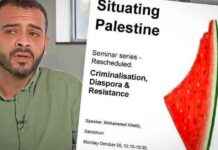the Public benefits to the residents in the copenhagen ghettos is the race up in a milliardudgift recent years.
In a response to Parliament from the minister for employment Troels Lund Poulsen (V) is calculated, that these costs total sounds at eight billion dollars over 14 years.
According to the folketingssvaret had in the same period been able to remunerate approximately 1200 full-time employees social and health care assistants for a similar amount.
in total There are seven areas in Copenhagen on the government’s ghettoliste.
– It is quite preposterous, saith the Liberal party socialordfører, Martin Geertsen, when he is presented with the figure.
– The fact that you haven’t got people from passive income support in employment, simply do, that there is something of a public service, we do not get. It is the simple equation, he continues.
– It is a tremendously high figure, is the reaction of the socialist boligordfører, Kaare Dybvad, at the cost of public benefits in the copenhagen ghettos.
– the Social democrats, we believe fundamentally that if people lived in more mixed, they would have a better chance of getting jobs, he adds.
Looking at the development over the past 14 years, is the cost to the public increase in the Danish ghetto areas in spite of everything steadily decreased.
In 2017, said the overall figure of 500 million dollars from 665 million in 2004.
the Extra Leaf has recently described how there are big problems with unemployment in the country’s disadvantaged areas.
In total, nearly eight out of ten female residents with ikkevestlig background in these areas outside the labour market.
The corresponding figure for the men is 66 percent, showing a statement from the ministry of Employment.
In the same areas live in a total of 60 percent of the residents with ikkevestlig the basis of money from the public.
——— SPLIT ELEMENT ———
the Left: It is a collective failure
Martin Geertsen, socialordfører Left.
– Why are the numbers?
– I think there has been too much slendrian and too little focus on getting people from passive income support and over in any employment. It is bl.a. something we see in Copenhagen, but probably also in many other municipalities.
– It is a failure of the economy, but it is also a failure of the individual. I think it is respect for the other people to make sure to provide them something to do.
– It is not a new problem – in fact, the numbers are steadily declining. Have politicians not sleeping well and thoroughly in an hour?
– I do not think there is anyone here who has something to let each other hear. It is a collective failure of the people who have walked around on passive income support. And it is also a failure of the economy.
——— SPLIT ELEMENT ———
nuclear weapons: Some actions have not worked in the
Kaare Dybvad, boligordfører, the Social democrats.
– Have the politicians over a broad area, not let the problems stand for?
– Yes, in the sense that some of the measures to create more mixed residential areas has not been effective enough.
– But there are also some places where it has worked. If you go to Ishøj, so it has adopted, worked. If you go to the Akacieparken in Valby, so you will see that there has been a dramatic change in the light of the things has been taken back in time. But there are still some areas, such as Tingbjerg, where the actions has not worked. This is why we’re doing something new.
——— SPLIT ELEMENT ———
It says the in the ghetto
Extra Magazine took a trip to the Hørgården on Amager, which is one of the seven copenhagen residential areas on the government’s ghettoliste.
Here we asked local residents why they think that so many people with ikkevestlig background, outside of the Danish labour market.
Now personally I am even in the work, but there are very many – and I’m sorry to say it – but most foreign women, who’re not doing anything. I very much believe that it’s all about the language and the lack of education, but also cultural differences and a thought that women should not work. Now I’m very honest, but in some cultures, if you do not have a big training and will have to take a cleaning job, it is not just the case.
– I have even experienced problems with to get the work done in the past. Now it’s not, because racism is so prevalent in Denmark, but nevertheless, you can experience more places in the community, for example in bars, that they sort them with a darker glow. A little of the same looking also at the labour market, I think – perhaps because we hear so much about problems with immigrants in the media.
– I do not think it is so strange, that there live many out here that do not have a job. Here is cheap to live, so it is one of the only places in Copenhagen, you can stay if you are on welfare. I myself have been homeless for three years, but got a small one-bedroom apartment out here two years ago, and I’m wildly happy. I’m also on welfare, and this is one of the only places I can stay.
– I think it is completely unfair that you even call residential areas to the ghettos. If there are people with a background in the rise of non-western countries that do not have a job, is it not, because they will not work, I think. I even have a name, which does not sound English, and I have experienced many times, that it is much harder to find a job, if one is not called Søren.








